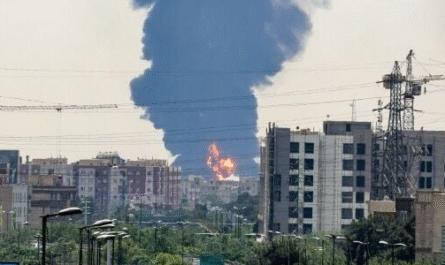In a dramatic escalation of already simmering tensions in the Middle East, Iran has launched a missile attack on a U.S. military base in Qatar, marking one of the most significant retaliatory moves in the region in recent years. The strike comes just days after Iran accused the United States of orchestrating covert air raids on its nuclear facilities, an act Tehran described as a “clear violation of international law and sovereignty.”
💥 The Attack: What We Know So Far
According to early reports from regional and international news outlets, multiple ballistic missiles were fired from Iranian territory in the early hours of the morning, targeting a key U.S. military installation in Qatar. The Al Udeid Air Base, which houses thousands of American personnel and plays a critical role in U.S. operations across the Middle East, was reportedly among the targets.
- Time of Attack: Approx. 2:15 AM (local time)
- Missile Type: Believed to be medium-range ballistic missiles (exact model unconfirmed)
- Damage Report: Initial assessments suggest structural damage to parts of the base; extent of casualties remains unclear
- US Response: A Pentagon spokesperson confirmed “incoming threats” and said “appropriate countermeasures were activated,” but declined to elaborate
🧨 What Triggered Iran’s Retaliation?
The missile strike comes in direct retaliation for what Iranian officials claim was a “blatant act of aggression” by the U.S., allegedly involving stealth airstrikes on multiple Iranian nuclear research and enrichment facilities in the cities of Isfahan and Natanz. While the U.S. has not officially confirmed its involvement in those incidents, satellite imagery and intelligence leaks suggest a coordinated precision bombing operation may have occurred earlier this week.
Iranian Foreign Ministry Statement:
“The Islamic Republic reserves the right to defend its territorial integrity. Today’s action was a proportionate and lawful response to unprovoked aggression against our nuclear infrastructure.”
Iran Strikes Back: Missile Attack Hits US Base in Qatar After Nuclear Site Bombings
🌍 Regional & Global Reactions
🇶🇦 Qatar:
The Qatari government has condemned the missile attack, calling it a “dangerous and destabilizing action” but also criticized the unauthorized use of its territory for attacks against a neighboring country.
🇮🇷 Iran:
Iranian state media is portraying the strike as a “historic blow to American arrogance in the Gulf,” with mass rallies held in Tehran in support of the IRGC’s action.
🇺🇸 United States:
While U.S. officials have yet to offer a full account of the damages or casualties, the National Security Council has convened an emergency session, and President of the United States is expected to address the nation shortly.
🇺🇳 United Nations:
The U.N. Secretary-General has called for “urgent de-escalation” and warned that continued conflict between two powerful states could “ignite a catastrophic regional war.”
⚠️ What’s Next?
With tensions at an all-time high, analysts warn that the missile attack could mark the beginning of a larger military confrontation between the U.S. and Iran, with potential fallout across the entire Gulf region.
Potential Consequences:
- Heightened U.S. and allied military presence in the Gulf
- Possible retaliatory strikes on Iranian missile bases
- Increased oil prices amid fears of supply disruption
- Civilian evacuation advisories from Gulf states
- Risk of cyber and proxy warfare escalating
📊 Economic Impact
Oil markets reacted instantly, with Brent crude jumping by over 7%, crossing the $90/barrel mark amid fears of regional instability. Stock markets across Asia and Europe also showed signs of distress, while safe havens like gold and the dollar rallied.
📝 Final Thoughts
This latest exchange between Iran and the U.S. marks a significant turning point in Middle East geopolitics. As the world watches anxiously, the hope remains that diplomatic channels will reopen before a broader military conflict erupts.
For now, the Gulf stands on edge, and global powers are scrambling to contain a crisis that could reshape the region’s future for years to come.



